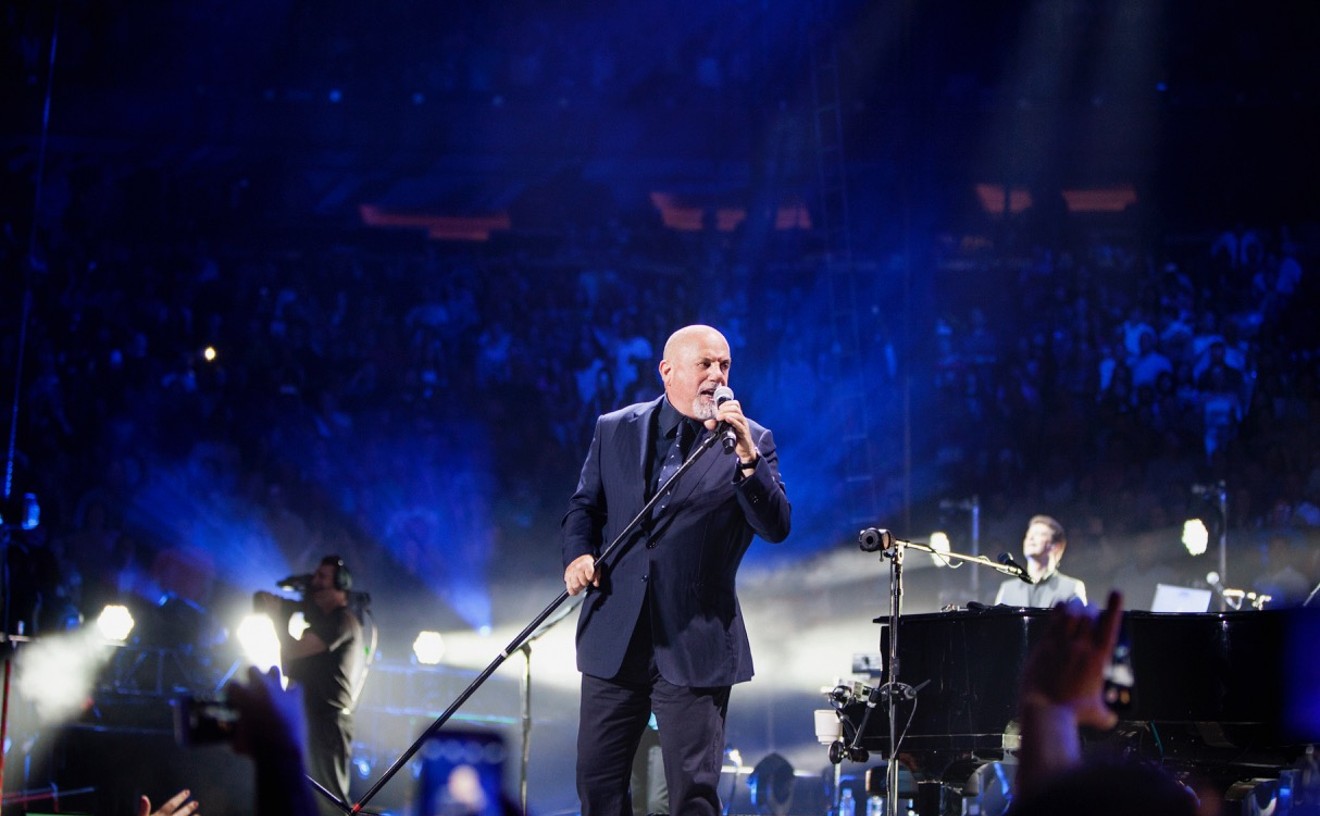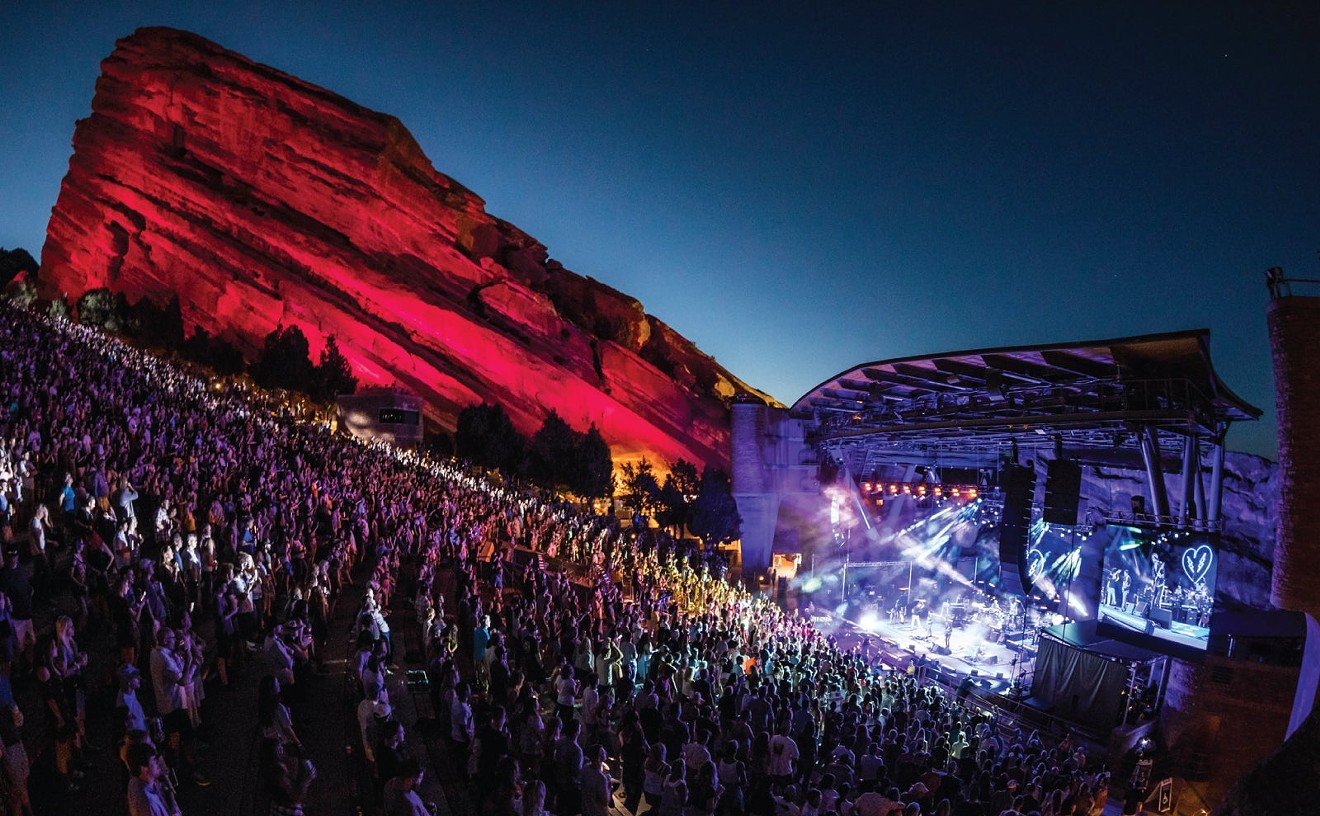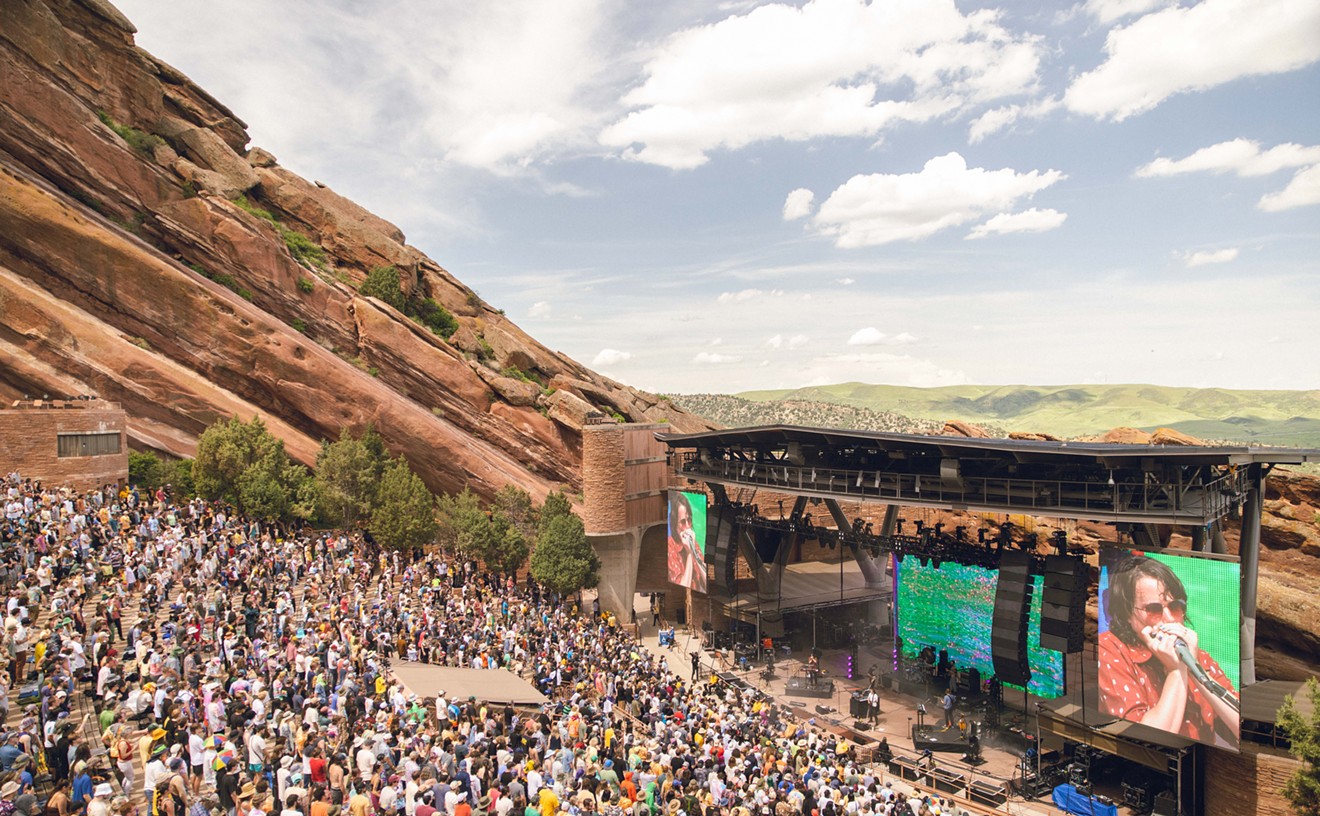OM first formed when Al Cisneros and Chris Hakius got together a handful of years after their old band Sleep parted ways in the late '90s. The idea was to create a project that used rhythms to convey meaning in a fashion akin to Tibetan devotional music or Gregorian chants. From 2003 until the departure of Hakius in the beginning of 2008, the duo created an impressive body of contemplative, even meditative, heavy music that some have referred to as "transcendental metal."
See also: - Wednesday: OM at Larimer Lounge, 2/13/13 - The six best metal shows in Denver this month - The ten best concerts in Denver this week
Grails drummer and primary Holy Sons songwriter, Emil Amos, was tapped to play drums in the new line-up that also includes Robert Aiki Aubrey Lowe of Lichens (and formerly of experimental rock band 90 Day Men). As a trio, OM has released a pair of albums, 2009's God Is Good and the group's latest effort, 2012's Advaitic Songs. We recently spoke with Amos and Cisneros in two separate conversations about Yellow Swans, the primacy of rhythm and how songwriting for this band is a lot like sculpting.
Part I with Emil Amos
Westword: Why did you want to be involved in producing music by Yellow Swans?
Emil Amos: That's really funny you ask that because I swear I was in bed just thinking about that last night. I was giving advice to a friend, and I was thinking about how I did that for free, working with them. It was actually a good bit of work, and I wanted to tell my friend that sometimes it's important to do things for free. Sometimes it's important to not ask, "What am I going to get?" I did that seriously just to learn. I thought I would learn a lot, and I also didn't think I should charge them because I had never been officially a producer of someone else's band. I felt like I might end up learning more than they did and I was excited to see what would happen.
I don't really talk to too many people about that record, so I don't even know what kind of feedback it got. I think I may have heard that some people think it's one of their better records. That record is called At All Ends on Load. Pete [Swanson] was this guy around town, and I would see him at Grails shows, and Liz [Harris who is Grouper] and I did that Jandek stuff, and he would show up at that stuff. From there, we just started talking, and it happened quickly.
What do you feel you learned from having done that?
To tell you the truth, I didn't learn that much because, to their credit, they kind of exist on their own planet. They certainly don't follow any rules that any musician that initially walks into the studio assuming to be true about how you build a song. So, in a way, it was almost impossible for me to take up any sort of methodology I could apply later, because every song was sort of an exploration of tones.
In a sense, it was completely outside of all basic, obvious, guiding boundaries and rules, definitely more than anything I've worked on, and I think that's a pretty heavy thing to say. I don't know if that sounds cliché, but even the most avant-garde stuff I usually do by myself always tends to have some form of rhythm underneath it and largely they didn't have any.
Presumably you'd heard of Sleep and OM before you started working with Al Cisneros.
Yeah, we have a little kind of extended family through the Neurosis guys, who originally signed Grails and largely changed my life and that of all the guys in Grails because it set us out on this trajectory. If they had never put out the early Grails records, we wouldn't have met most of the people we still work with today, and we wouldn't have played shows with tons of our friends now. Basically, it created what became our band, and Al was a really early, close friend of Steve Von Till's. So we kind of all just came together. That's how things really happened: just people hanging out and sharing ideas.
Did you approach Al about being in OM?
Oh, no. It was a big surprise. I was sitting at work one day, and I had just broken up with my girlfriend of eight years, and I was having a pretty intense kind of day sitting at work and thinking about what was going to happen in my life. Literally, that same day that that was all going down, the phone rang. We'd never spoken on the phone before. We'd gone on tour together two times. But it's not like we phoned each other all the time.
Then, all of a sudden, the phone rang, and it was him, and I was like, "Hey, how did you get my work number? What's going on?" It seemed really out of the blue. Then the trajectory of my life changed again and went that direction. It all felt really natural in a way, like it was supposed to happen that way, and I just had to go with it. Grails had done an East Coast tour with them and a little West Coast tour. That came through, in a way, through Neurosis, too, because Al may never have seen me play had we not opened for Neurosis at the Great American Music Hall.
Why has Billy Cobham been such an inspiration to you as a drummer?
Well, it's funny because he's a big inspiration on Al, too. I remember hearing about that in his interviews back in 2003, when I was first reading about OM. I thought that was funny because that's not the first thing you think when you hear OM, as in really pyrotechnical stuff. So I was kind of curious about that, and the more we hung out on tour, the more I realized he was a massive Mahavishnu [Orchestra] fan, I'd say beyond me. He knew more of the records and stuff.
Honestly when you're growing up playing drums in jazz band in school, there's four or five drummers that all drummers talk about and even the trumpet players freak out on. In high school, it's like your religion. In jazz, you know or you don't know, and Billy Cobham is part of the vocabulary. That's pillar number three and you have to study it. It's largely like Steve Gadd, David Garibaldi is a big one and Bill Cobham, of course Neil Peart and stuff like that.
When last we spoke, you discussed how you don't really feel like you're truly a drummer. Yet you play drums in both Grails and OM.
Yeah, it just sort of started out of practicality. When we were forming Grails, it was a side project of two or three other bands. It was kind of a lark. A friend had asked us to basically put together something for an art opening. Just everybody looked around, and I said, "Okay, I guess I'll play drums." Even though I hadn't really played drums in what felt like years. Really it felt like a decade. I had played drums for my own recordings, but I hadn't practiced in years.
It was kind of funny. I thought it was almost weird that I would be back on drums. But from the first show, people just had this really strong reaction to that band and immediately wanted us to play more shows and wanted us to put out a record. That band had a strange magnetism, and it was weird because none of us particularly thought we wanted to be in it.
It kept rolling on, and as I kept trying to get back to Holy Sons or stuff like that, people kept saying, "Oh, that guy's a drummer!" It's almost like I had to make a new style to entertain myself. So the early years of that band, I was largely really sloppy and kind of looking for this new emotional language for drums that was heavily inspired by the late Charles Gocher of Sun City Girls. I was like, "Man, I just need to disregard all rhythmic rules." That's why a lot of the early Grails music is just kind of coloration. It's very loose and looking for a vibe. When I joined OM, my job changed, and it was a whole new challenge. It's a totally different vocabulary.
Part II with Al Cisneros
Is there a tambura on Advaitic Songs?
Al Cisneros: Yeah, on "Gethsemane."
What do you like about the sound of that instrument and what it conveys in the music you're doing?
It conveys sort of the same thing as bass frequencies. It's a substratum that's constant, and it's unchanging underneath all the variations above. It's cool because it also sounds like it goes together.
Who plays that instrument live?
It's [Robert Aiki Aubrey Lowe]. Over the past few years, it's grown to be a three piece band.
How did you meet Rob?
We were on the same label. OM's first album and Lichens' first album. Then we met at a show. Lichens was really different. I wish I'd had the opportunity to see the 90 Day Men.
When you were forming OM, was it founded on bass and drums for the instrumentation?
Yeah, just rhythms. It was everything we needed. The percussion got the rhythm and the groove, and the riff happens through the groove, so it was all there. Why have a guitar because you're "supposed" to have a guitar? That's a lot to deal with, having to deal with all the guitar player egos and all of that. It's better to have the songs tell us what we need to put in them and take it as it comes, go slow and let the songs build. Then it just turns out better.
Live do you use samplers or other devices?
It's far beyond a bass amp and a drum set now. I'm excited with the live show because we've translated the studio music into a really cool show that really holds the energy and conveys the feelings.
Do you feel that archaic music from various cultures and religious traditions informs what the band does rhythm-wise?
In some ways. But ultimately it's just the way the song sounds to us that is the outcome.
For Advaitic Songs, did you incorporate Arabic and Persian musical ideas into the songwriting more so than on previous albums?
No, I mean it's just what it is. It's the sounds of the songs we were hearing in ourselves, and that's the music that is on the album. It's just the sum total of the three musicians and the way that we hear music and what we think needs to be communicated in that song. It's not a design, like, "Oh, let's have this sound like it's Turkish scale, Persian scale today." There's always a rhythm. It's a really cool band in the sense that we know when the song arrives. It really does. We're like, "Yup, that's it." We know from that point we switch over to being technicians and then make it more structured. But I'd say 90 percent of the song, the essence of the song, is already there and we just tuned into it.
It's kind of like sculpture.
Yeah, it's in the block. It's already there. Exactly.
Emil Amos has been in the band for the last few years. How did you meet him, and why did you feel like he was a good person to be the drummer for this band?
We did a tour of the Northwest in 2005, maybe. We became good friends, and we really got along well. [We have] amazing music compatibility and a lot of the same inspirations. We resonated with one another well. He's an amazing musician.
You're touring with Sir Richard Bishop. Was it your choice to tour with him? What do you appreciate about his music?
Definitely. [His music is] his path. It's his heart through sound. I really respect that.
What attracted you to playing bass as opposed to another instrument and what continues to fascinate you about playing bass?
In my first band, I was trying to play drums, and Chris [Hakius] had a bass, and Chris was better at drums. He could play this one beat I could never play. We wanted to make a band so bad that I just started to play the bass. It was cool because we could make more progress. From there it just seemed like the way to go.
Drums and bass both are equally inspiring to me. It was cool -- switch over to Geddy Lee. It was alright, and I'm happy it went that way. And you know, it's neat because those two instruments are very similar -- bass is a percussive instrument. I don't mean slap bass; I mean that it's just rhythmic. The rests, the space in it. There's lots of notes you don't play, as well as those you do play. It's just awesome.
Follow @Westword_Music











